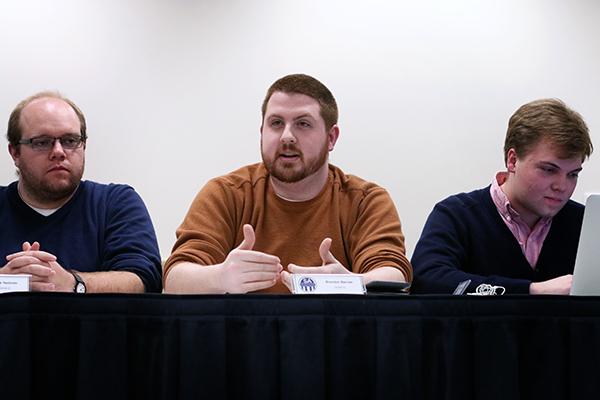Updated: April 7, 2016 at 11:13 a.m.
The Student Association Senate is clarifying what senators are expected to do.
The senate passed six bills at its meeting Monday, which ranged from attendance to the process of electing an executive vice president. Senators said the changes, which clarify existing rules, will clear up senate policies and set strong expectations for incoming senators.
Sen. Brandon Bernier, SEAS-G, introduced the six bills after he said he realized “how much of a mess [the bylaws] were.”
“I noticed many of the errors and inconsistencies throughout the bylaws that I wanted to go back and fix. This slate of bills was simply the culmination of various issues we had noticed in the bylaws that we wanted to improve,” Bernier said in an email.
After a debate during Monday’s meeting, the senate voted to change its attendance policy and mandate suspensions after missing a set number of meetings. Under the previous policy, senators could miss 40 percent of meetings.
Senators will now be suspended after missing three consecutive or six nonconsecutive full-senate meetings, or four consecutive or eight nonconsecutive committee meetings in one senate term.
Executive Vice President Thomas Falcigno suspended seven senators last month for being chronically absent from meetings. None of the suspended senators have been reinstated yet.
Falcigno said after the meeting that he supports all the bylaw changes because “each bill makes the senate work more efficiently.”
Sen. Sydney Eskin, SEAS-U, proposed adding an amendment that would excuse absences for classes, personal health or emergencies. The senate did not pass any amendments to account for excused absences.
Sen. Arielle Katcher, SMHS-G, said for many graduate students, meeting times at 9 p.m. on Mondays are “ridiculous.” She added that, given medical students’ busy schedules in class and on hospital shifts, “a month’s worth of meetings is not a lot of meetings to miss.”
Bernier added that SA leaders could be open to potential biases by allowing excused absences.
“We’ve never had excused absences in the senate before, and I think we need to seriously consider what we’re doing. I think you’re going to have senators, such as our law senators this year, not show up to a single meeting. This is going to be abused left and right,” he said.
Another bill clarified the process of replacing an executive vice president who resigns in the middle of the school year.
When former Executive Vice President Casey Syron stepped down in January, the senate rejected SA President Andie Dowd’s initial choice to replace him.
The bill requires two-thirds of the senate to approve all executive vice presidential candidates. In the event the SA president’s nominee is rejected by the senate, he or she could not be considered again during that term. The SA president would then have to appoint another nominee at the next meeting until a new executive vice president is approved.
Other changes included ensuring that a senate committee approves vice presidential cabinet members, mandating that vice presidents attend the committee meetings and allowing the leadership committee to approve all bylaw changes before they can be considered by the full senate.
This post was updated to reflect the following correction:
The Hatchet incorrectly reported that Sen. Arielle Katcher, SMHS-G, said SA leaders could be open to biases by allowing excused absences. Sen. Brandon Bernier, SEAS-G, said this. We regret this error.







